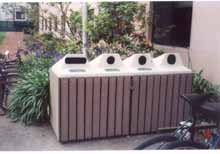 Receptacles like this one at San Francisco State College sort out different materials for recycling.
Receptacles like this one at San Francisco State College sort out different materials for recycling. Recycling is not exactly a buzzword at Northern Kentucky University. Nor, say some, could NKU be considered environmentally friendly.
Problems with inadequate equipment, shortage of personnel and lack of commitment to the environment have been cited as the main obstacles to a better recycling program.
Although NKU has been recycling for 15 years, it still lacks the equipment to shred paper, crush cans and bail plastics. What it does have is a baler for paper and cardboard. “Plastics are the main thing we need to recycle,” said Miriam Kannan, regents professor of biology and faculty advisor to the student organization
Environmentally Concerned Students. “It will take hundreds of years for a plastic bottle to break down.”
The number of plastic bottles has increased dramatically since the University switched from Coke to Pepsi products. While many of the Coke products were dispensed in aluminum cans, all Pepsi products come in plastic bottles.
Numbers provided by the Business Operations/Auxiliary Services office at NKU show from vending machines alone, 9,944 cases of Pepsi products in plastic bottles have been sold on campus since Aug. 27, 2001. A call placed to the cafeteria services asking for its numbers was not returned.
Those numbers break down to 1,326 bottles a day, or 55 an hour, most of which will end up in a landfill. National numbers show 2.5 million plastic bottles are thrown away every hour in the United States. “Where are the priorities?” asked Kannan. “We have an environmental science major, we’re planning an environmental studies major; we have a minor now. The students who come here wanting to study environmental issues are appalled. They’re the ones who started ECOS.”
Some time ago, a statement issued by the Environmental Concerns Subcommittee, recommending more funding be provided to Chuck Pettit, superintendent of custodial services with the physical plant at NKU, to expand recycling on campus to include plastics. Pettit said limited personnel, students throwing trash in recycling containers, and not having the particular type of machine that bales plastic contributes to the recycling problems. “Lots of garbage ends up in these yellow barrels you see sitting around,” said Petit. “We don’t have the manpower to sift through the garbage.”
According to Pettit, items such as shoes, book bags, clothes and silverware have been found in the barrels.
He went on to say that with the help of students, the recycling of paper has increased greatly, from 17,175 pounds in 1998 to 57,800 pounds in 2000. Approximately four years ago, students from ECOS set up an “adopt a floor” program where students monitor recycling receptacles and call Pettit when the receptacles are full. Students have also helped with sorting. What Pettit would like to see the University do is buy an industrial shredder. Then, he said, NKU could triple the amount of recycling it does.
“Machines for shredding are expensive,” said Kannan, “but it would pay off in a very short time if the University just had a conscience of getting a machine like that. They don’t mind spending $100,000 on a sign in front of the building.”
Pettit said the University could possibly do more, but he thinks they do a lot with what they have. Kannan says more can be done now. Things like labeling the yellow bins, encouraging campus food vendors to use reusable cups, and a marketing program saying to please recycle would make recycling more visible.
Also, she said, installing inexpensive and more attractive recycling bins would help alleviate the trash problem. Kannan asked for help as well in helping ECOS with its main fund raiser, the recycling of ink jet and laser printer cartridges. Instead of throwing away the cartridge, call ECOS at 572-6649 and a student will come and pick it up.
“You don’t have to be an environmental scientist to be interested in the environment,” said Kannan. “You just have to be a breathing human being.”

